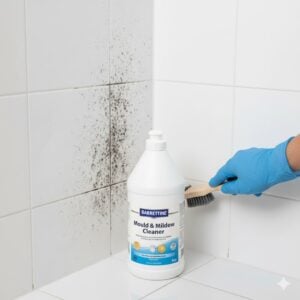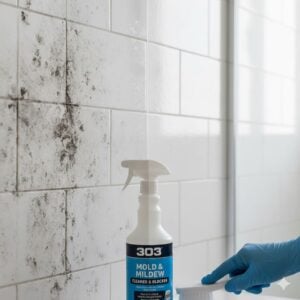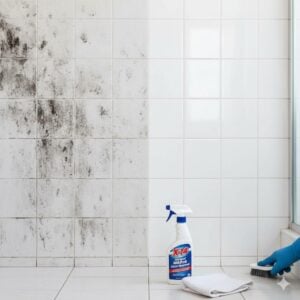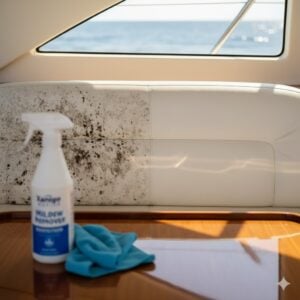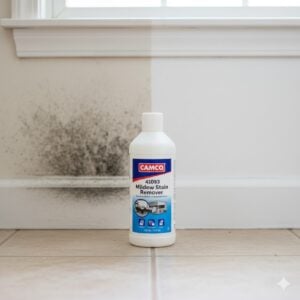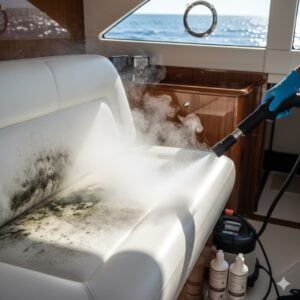Discovering mildew under caulk in your bathroom, kitchen, or around sinks can be an unpleasant surprise. It’s not just unsightly — it can also release spores, create musty smells, and damage sealants if ignored. In humid regions like the UAE, mildew under caulk is one of the most common hygiene issues due to constant moisture and condensation. The good news is that with the right approach, you can safely remove it and prevent it from returning. Below are 12 practical DIY tips for cleaning mildew under caulk, plus insights into when it’s time to call experts and how much it costs in the UAE to fix it professionally.
Table of Contents
ToggleUnderstanding Mildew Under Caulk
Mildew is a surface-level fungus that grows in damp areas with poor ventilation. Under caulk, it thrives where moisture gets trapped between tiles and sealant layers. Over time, it causes black, brown, or green discoloration lines, unpleasant odors, and gradual decay of silicone material. Left untreated, mildew can penetrate grout, tiles, or even the drywall behind your sink or bathtub.
In the UAE, humidity from showers, air conditioning, and limited ventilation creates an ideal environment for mildew. Bathrooms, kitchens, and laundry areas are particularly vulnerable.
Signs You Have Mildew Under Caulk
- Black or gray streaks forming along the caulk line
- Persistent musty or damp odor even after cleaning
- Caulk turning soft, brittle, or peeling away from the surface
- Dark spots reappearing soon after wiping or bleaching
- Visible moisture behind transparent silicone
12 DIY Tips to Remove Mildew Under Caulk
If the infestation is mild, you can tackle mildew yourself before it spreads deeper. These 12 techniques combine household materials and simple tools that are safe and affordable.
1. Use a Vinegar Spray
Vinegar is mildly acidic and kills most mildew species. Mix equal parts of white vinegar and warm water, spray directly on affected caulk, and leave for at least 30 minutes before scrubbing with an old toothbrush.
2. Try Baking Soda Paste
Combine baking soda with water to make a thick paste. Apply it along the caulk line and leave for an hour before rinsing. This not only lifts mildew but neutralizes odor.
3. Apply Hydrogen Peroxide
For tougher stains, hydrogen peroxide (3%) can bleach mildew effectively. Apply with a cotton pad and cover with plastic wrap to let it sit for 1–2 hours before wiping off.
4. Use a Bleach Solution Cautiously
Bleach is powerful but should be used sparingly. Mix one part bleach with ten parts water and apply with a sponge. Wear gloves and ventilate the area well. Avoid combining bleach with other chemicals.
5. Remove Old Caulk Completely
If mildew has spread beneath the surface, cleaning alone won’t solve the problem. Use a caulk remover tool or utility knife to scrape away the affected sealant carefully before cleaning underneath.
6. Disinfect Before Re-Caulking
After removing old caulk, scrub the exposed area with vinegar or peroxide to kill any remaining mildew spores. Dry completely using a hair dryer or heat gun on a low setting before applying new caulk.
7. Choose Mold-Resistant Caulk
Always reapply caulk designed for bathrooms or kitchens, labeled “mold-resistant” or “silicone with fungicide.” This prevents new mildew growth in humid UAE environments.
8. Improve Ventilation
Keep bathroom doors or windows open after showers, or install an exhaust fan to lower humidity levels. Airflow is crucial to stop condensation buildup on caulk lines.
9. Dry Wet Surfaces Daily
Wipe tiles, corners, and sinks after use to reduce moisture accumulation. Even a quick towel wipe can prevent future mildew growth.
10. Use a Dehumidifier or Moisture Absorber
Compact dehumidifiers are available for small bathrooms and kitchens. Alternatively, place silica gel or moisture absorber packets in corners prone to dampness.
11. Clean Regularly With Natural Solutions
Once mildew is removed, maintain the area weekly using vinegar or mild antibacterial sprays. Consistent cleaning prevents buildup and keeps caulk fresh.
12. Inspect Plumbing Leaks
Hidden water leaks from faucets or pipes can feed mildew growth from beneath. Check for dripping or condensation and repair immediately to prevent reinfestation.
When DIY Isn’t Enough
If mildew keeps returning or has spread beneath tiles, it’s likely beyond surface-level cleaning. In these cases, you may need to replace caulk entirely and sanitize the underlying area using professional equipment. Long-standing mildew often embeds in grout pores and subfloor materials, making DIY solutions ineffective.
Persistent mildew under caulk should always be handled by professionals like Bio-On UAE. Their technicians use high-heat steam extraction and anti-fungal treatments that remove mildew from both visible and hidden layers without damaging tile or silicone.
How Experts Like Bio-On UAE Handle Mildew Removal
Bio-On UAE is specialized in mold remediation and environmental cleaning, providing deep sanitation beyond what household methods can achieve. Their mildew removal process typically includes:
- Visual and moisture-level inspection of affected surfaces
- Complete caulk removal and surface disinfection
- Steam cleaning using 160°C vapor for full sterilization
- Application of anti-fungal and deodorizing treatment
- Re-caulking with mold-resistant silicone for long-term protection
Bio-On’s methods are safe for bathrooms, kitchens, and commercial facilities. Using eco-friendly products, they prevent spore regrowth and ensure air quality improvement throughout the property.
Estimated Cost of Mildew Removal Under Caulk in UAE
Costs depend on the severity of contamination and total surface area. Below is an average cost breakdown for mildew and mold treatment in UAE homes:
- Small bathroom corners or sink edges: AED 100–200
- Full shower caulk replacement: AED 250–400
- Kitchen sink and backsplash area: AED 200–300
- Extensive wall or grout treatment: AED 25–40 per sq.m.
Prices vary depending on inspection results. Bio-On UAE offers free assessment for surfaces over 10 sq.m. and guarantees transparent pricing before any work begins.
Why Professional Removal Is Worth It
DIY methods can delay mildew temporarily, but only professional-grade cleaning ensures full spore elimination. Experts use high-temperature steam and air filtration systems that remove contaminants completely. This prevents mildew from returning — saving you from repeated scrubbing and replacement costs.
Professional treatment also preserves your caulk and tile lifespan. Continuous DIY bleaching can weaken sealants, while Bio-On’s treatments restore rather than damage surfaces.
Tips to Prevent Mildew Return After Cleaning
- Keep the area dry after use and improve ventilation.
- Inspect caulk every three months for cracks or dark spots.
- Use neutral pH cleaners instead of harsh bleach weekly.
- Wipe away standing water around bathtubs or sinks.
- Schedule professional inspection every 6–12 months in humid homes.
Conclusion
Dealing with mildew under caulk requires more than just surface cleaning. While vinegar, baking soda, and peroxide can help temporarily, humidity in the UAE makes recurrence almost inevitable. If you notice black lines, musty odors, or peeling caulk, it’s time for a deeper solution. Bio-On UAE provides specialized mildew and mold removal using eco-safe, high-heat steam technology that restores cleanliness and hygiene to your home. To keep your bathrooms and kitchens truly safe, contact Bio-On UAE through WhatsApp, phone, or the form on this page and schedule your free inspection today — because prevention starts with professional care.








